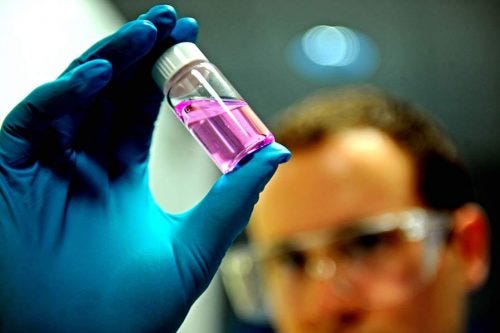The rollercoaster ride of Redx
A private future awaits the pharma company once heralded as the talisman of Northern biotech
Share prices don’t tend to skyrocket, or soar these days.
Yet as recently as February there was Redx, based in the former Astra Zeneca labs in Alderley Park, seeing its value as a traded stock on the Alternative Investment Market (AIM) pushing to the dizzying heights of 28.70p a share.
The trigger was a deal to sell “Kirsten rat sarcoma virus inhibitor program” to Dublin-based Jazz Pharmaceuticals PLC, a deal that landed an initial $10m with the possibility of $870million in development, regulatory and commercial milestone payments from Jazz.
The headlines in the financial press - including TheBusinessDesk.com - reflected the news - “Jazz hands at Redx” was one headline - as shares soared 44% to 28.70 pence each in London one Wednesday morning.
Yet such is the wild ride of pricing for ambitious pharma companies, that was less than half of the 52-week trading high of 70p and way below the target price of analyst Dr Mike Mitchell of Panmure Gordon, their NOMAD, who was still optimistic that the shares could reach 125p.
And as I write, Redx shares are trading at 7p, a slight recovery from yesterday’s 66% tanking to 6p on the back of the news that Redx is joining other northern cash hungry, ambitious and science-based business in opting for a private future, off the stock market and seeking capital without the glare of publicity or the need to pay armies of brokers, a NOMAD, running an AGM, investor roadshows, having a city PR firm on retainer and spending up to £20,000 a year just for the privilege of a listing on the London stock exchange.
It’s a headline we could have written every other day.
Last week Byotrol and Manchester-based drug discovery business C4X made similar announcements citing the cost of a stock market listing and the lack of liquidity in their ailing shares.
Dr. Jane Griffiths, chair of the board at Redx Pharma, an experienced former Johnson and Johnson executive, and currently also a non-executive director of BAE Systems, seems firm in her belief that the business is sound: "Redx has a strong track record: over the last five years we have delivered six molecules that are in the clinic and established four major partnering deals, validating our scientific and partnering capabilities.”
But her comments on the state of the stock market, AIM in particular, were pointed: “Despite completing some of the largest AIM capital raises for biotech companies in recent years, Redx is still liquidity constrained on AIM. As a result, we believe our current market valuation is not reflective of our track record or future potential and is not conducive to raising the level of capital required for our growing clinical portfolio.”
She added the view that as a private company Redx will be able to access “a broader universe of specialty investors and, accordingly, a larger quantum of future funding required to execute our strategy” and will then be better placed to seal a stronger valuation on acquisition, or through licensing.
But she was also at pains to commit to the UK: “We continue to believe that the UK is an excellent hub for scientific discovery and drug development and remain committed to being part of the UK life sciences community retaining our facility based at Alderley Park."
In an echo of the reasons given by both Byotrol and C4X last week, the statement also cited the costs and regulatory burden of a stock market listing as a reason to quit.
But it’s also worth looping back to look at Redx Pharma’s recent history for a few clues as to what else might be going on.






